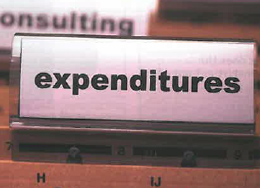

 With a significant number of H M Revenue & Customs enquiries focusing on business expenses, this is an important area and one where it is easy to make mistakes. We look below at the most common types of business expenses and at what is, and is not, allowable for tax purposes.
With a significant number of H M Revenue & Customs enquiries focusing on business expenses, this is an important area and one where it is easy to make mistakes. We look below at the most common types of business expenses and at what is, and is not, allowable for tax purposes.
The general rules
There are two basic rules. Firstly, in computing trading profits, no deduction is allowed for items of a capital nature and similarly capital receipts are not taxable.
So when buying items for on-going use in a business – a computer, say, or a car – the full cost is not automatically deducted from profits; instead, capital allowances are claimed, although the effect of the 100% Annual Investment Allowance (AIA) – of which more below – is that for many businesses the full cost of capital expenditure is deducted in the year it is incurred.
Secondly, in order for an expense to be deductible, it must have been incurred “wholly and exclusively for the purposes of the trade”. Expenses which have a dual purpose – trade and non-trade – are not deductible, although HMRC will allow the business proportion of an expense, where such a proportion can be defined.
Specific expenses
Travel and subsistence: The cost of travelling in the course of the business is allowable but not that of travelling between home and the place of business. The “dual purpose” rule means that where there is a material private element, the whole expense of a trip will be disallowed, even the part attributable to business purposes. Thus, no part of expenses incurred in travelling abroad partly for a holiday and partly on business is allowable.
The above rule also requires the disallowance of costs of food, drink and accommodation. However, a deduction is allowed for any reasonable expenses incurred on food or drink by a individual either at, or travelling to, a place in the course of carrying on the trade, but only if two conditions are met:
- that a deduction is available for the associated travelling costs; and
- that either:
o at the time the expenses on food and drink are incurred, the trade is itinerant; or
o the trader does not visit the place more than occasionally in the course of the trade and the travel is not part of a normal pattern
Hotel accommodation is deductible where a business trip necessitates one or more nights away from home (and away from the business base).
Motor expenses: individuals can claim their actual business motoring costs in their accounts and in practice HMRC will generally agree a business-use proportion of total motor costs, based on mileage records; alternatively, taxpayers with a turnover not exceeding the VAT registration threshold (currently £70,000) at the time they first use the vehicle, may instead use the statutory tax-free mileage rates applicable to employees to arrive at an allowable amount. In that case, no other motoring expenses or related capital allowances may be claimed (other than interest on a loan to purchase the vehicle).
Entertaining: entertaining expenses are not allowable, except where provided for the trader’s employees.
Legal and professional costs: legal and professional costs associated with the taxpayer’s trade are broadly allowable, but following the general rule above, any such costs associated with capital items are not allowable against trading profits; where the item is a chargeable asset, e.g. property, related legal/professional costs may be claimed against the gain arising on its eventual disposal.
Use of home as office: if an individual uses part of his home for business purposes a proportion of the household expenses may be deducted in computing taxable profits, based on the usage of the property. In practice, where there is only small use of the home, HMRC will often agree a small flat-rate allowance for this purpose.
A point to note is that the exemption from capital gains tax for a gain arising on the sale of an individual’s home me be affected if a claim is made that a part of the property is used exclusively for business purposes.
Repairs & renewals: following the rule on capital expenditure, the cost of repairs and renewals are broadly allowable but the cost of enhancements or improvements are considered to be capital in nature.
Depreciation: although a business can chose the rate at which to depreciate its assets, any depreciation charged in the accounts will be excluded for tax purposes and replaced by capital allowances calculated at statutory rates.
For the current tax year, the AIA is £100,000, so 100% of capital expenditure of up to that amount can be deducted against profits. Where capital expenditure exceeds £100,000, the balance attracts capital allowances of either 20% or 10% on a reducing balance, depending on the type of asset.
Cars (purchased after April 2009), where expenditure is not covered by the AIA, attract capital allowances at 100% (where emissions do not exceed 110g/km) or 20% (where emissions are 110 – 160g/km) or 10% (where emissions exceed 160g/km).
Krystyna Knight, of Silver Levene provided research for this article.
Disclaimer
Umesh Modi BA ACA, is a Chartered Accountant and Tax Advisor, and a partner at Silver Levene (Incorporating Modiplus+). He can be contacted on 020 7383 3200 or umesh.modi@silverlevene.co.uk

